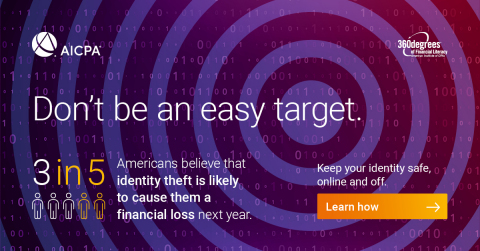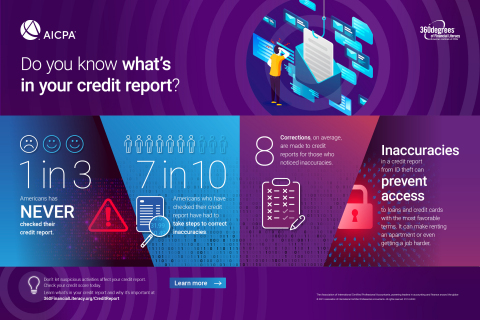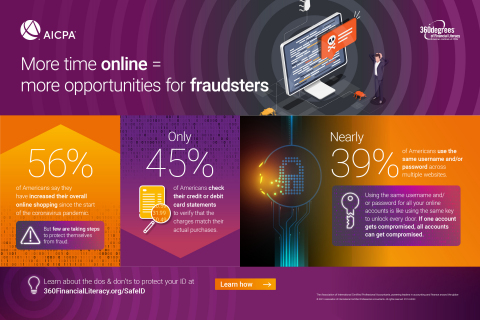NEW YORK--(BUSINESS WIRE)--Where do you see yourself in a year? If you’re like most Americans, you might expect to be dealing with the financial fallout of identity theft. Three in five Americans (60 percent) believe it is likely that identity theft will cause them a financial loss in the next year, according to new research conducted by The Harris Poll on behalf of the American Institute of CPAs (AICPA).
“Law enforcement has reported a big spike in online scams during the COVID-19 pandemic. Taking time to review your bank statements and credit card activity for unauthorized transactions, while also putting safeguards in place like complex passwords, credit card usage alerts and two-factor authentication, can go a long way to mitigate the threat of ID theft,” Gregory J. Anton, CPA, CGMA, chairman of the AICPA’s National CPA Financial Literacy Commission. “Safe steps also include exercising caution when reading emails and clicking on links, learning about the latest scams, and being mindful of your online presence.”
As Online Shopping Increases, Few Take Steps to Protect Themselves
More than half of Americans (56 percent) say they have increased their overall online shopping since the start of the pandemic, with nearly a third (31 percent) saying it has increased significantly. While convenient, online shopping is not without a risk. Fraudsters can gain access to private website data such as your personal information and financial details which can be used to make unauthorized purchases, or even open new accounts exploiting your identity.
The survey found that since the start of the pandemic more than a third of American online shoppers (37 percent) have stored logins, passwords, or credit/debit card information on websites or apps, while only 3 in 10 (28 percent) have set up alerts on their credit or debit card for when a purchase is made without their card being present. These stats may be why in the past year one in five Americans (19 percent) have suffered identity theft or attempted identity theft. These incidents can be quite costly, as Americans lost a total of $16.9 billion in 2019 to identity fraud, according to Javelin Strategy & Research.
While basic steps can help prevent being victimized by fraud, few shoppers are taking them. The survey found that less than half of Americans (45 percent) have checked their credit or debit card statements to ensure that the charges match their actual purchases since the pandemic began. Further, nearly 2 in 5 Americans (39 percent) admit they use the same username and/or password across multiple websites.
“Using the same username and/or password across multiple websites is like using a master key for every locked door in your life. If just one online account becomes compromised, scammers will have the keys to the information behind every password protected account,” said Kim Hardy, CPA/CFF, member of the AICPA’s National CPA Financial Literacy Commission. “The surge in online activity as people are spending more time at home during COVID has presented bad actors even more opportunities to steal identities. In this environment, it’s essential that Americans are defending their personal information from fraudulent threats.”
Lower-Income Households Less Likely to be Familiar with their Credit Report
While the survey finds that two-thirds of Americans (67 percent) have at least looked at their credit report, that leaves one-third (33 percent) of Americans who have never checked their credit report. And those with a household income of less than $50K were found to be twice as likely to never have looked at their credit report than those with a household income of $100K+ (45 percent vs. 21 percent). A credit report lists all the debt taken in your name and serves a clear way to see if there are any inaccuracies such as someone taking out loans or credit cards using your identity which can ruin your credit score.
“Maintaining a good credit score is important for Americans of every income bracket. A good credit score can unlock many long-term financial health benefits, such as access to loans and credit cards with the most favorable terms. Whereas bad credit can make it more difficult to lease a car, purchase a home or pass a background check for a new job,” added Anton.
Checking your credit report is the best way to understand your current credit position. Unfortunately, for many, it can lead to an unpleasant surprise. A majority of those who have checked their credit report (68 percent) had to take steps to correct inaccuracies, with the average being 8 specific corrections among those who have taken steps at least once.
Tips to Help Americans Protect Their ID
Hardy, who has years of experience in forensic accounting, suggests online shoppers take the following four steps:
- “Don’t wait for suspicious activity to occur. Take time to check your credit score for free at least once a year with one of the three major credit reporting agencies. And if you find that you’ve been the victim of identity theft, report it immediately to the Federal Trade Commission, your local police department, and the credit reporting agencies.”
- “Do your online shopping at home where you know both the device and the network are secure. On-the-go online shopping, though convenient, puts your personal information at risk. You have no control over who might also be using that unsecured public network.”
- “Check to make sure the shopping websites you visit are secure. The URL, also known as a web address, will indicate if a website is secure. Look for a website address that begins with ‘https://’ in lieu of ‘http://’ which is missing the ‘s.’ If you shop on an unsecured website, scammers can steal your personal and financial information from any forms you fill out.”
- “Be cautious of any unsolicited communications concerning COVID-19 that ask for your personal information. The Federal Trade Commission keeps an updated list of commons scams on their website.”
Americans who would like to learn more about the steps they can take to help protect themselves from ID theft can visit: 360FinancialLiteracy.org/SafeID.
Additional survey findings:
- One in five Americas (20 percent) feel it is extremely likely that identity theft will cause them a financial loss in the next year.
- Thinking about online shopping accounts, only half of Americans (49 percent) update their passwords more than once a year. A quarter (26 percent) of Americans only update their online passwords when prompted by the website. And 9% never update their passwords.
Throughout 2021, the AICPA will be exploring the impact of COVID-19 on consumers, businesses and the accounting and finance profession through a series of surveys, reports and other content. For more information, please contact Jon Lynch jonathan.lynch@aicpa-cima.com or James Schiavone james.schiavone@aicpa-cima.com.
Methodology
This survey was conducted online within the United States by The Harris Poll on behalf of AICPA from December 15-17, 2020 among 2,116 U.S. adults ages 18 and older. When asked about their credit report, respondents who selected “not sure” (33%) were excluded from this calculation. For complete survey methodology, including weighting variables and subgroup sample sizes, please contact jonathan.lynch@aicpa-cima.com.
About the AICPA’s 360 Degrees of Financial Literacy Program
The AICPA’s 360 Degrees of Financial Literacy Program is a nation-wide, volunteer grass-roots effort to help Americans develop a better understanding of money management and take control of their financial lives. Since 2005, the AICPA has been empowering people to make better decisions with the tools and resources on the 360 Degrees of Financial Literacy website. Financial Literacy is the cause of the CPA profession and the 360 Degrees of Financial Literacy program is the AICPA’s flagship corporate social responsibility effort. These efforts are focused on financial education as a public service and are completely free from all advertising, sales, and promotions. Connect on Facebook for tips, insights and motivation to keep your finances on track.
About the American Institute of CPAs
The American Institute of CPAs (AICPA) is the world’s largest member association representing the CPA profession, with more than 431,000 members in the United States and worldwide, and a history of serving the public interest since 1887. AICPA members represent many areas of practice, including business and industry, public practice, government, education and consulting. The AICPA sets ethical standards for its members and U.S. auditing standards for private companies, nonprofit organizations, and federal, state and local governments. It develops and grades the Uniform CPA Examination, offers specialized credentials, builds the pipeline of future talent and drives professional competency development to advance the vitality, relevance and quality of the profession.




